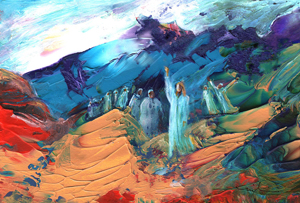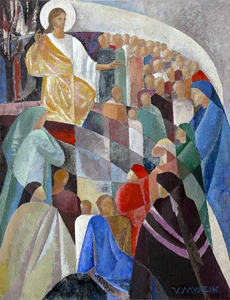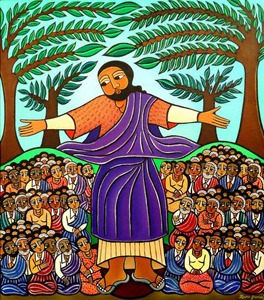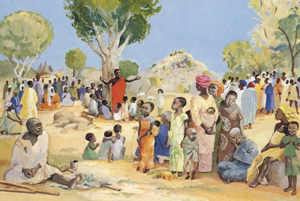For Sunday February 13, 2022
Lectionary Readings (Revised Common Lectionary, Year C)
Jeremiah 17:5-10
Psalm 1
1 Corinthians 15:12-20
Luke 6:17-26
Blessed are you who are poor, hungry, sad, and expendable. Woe to you who are rich, full, happy, and popular. This week’s Gospel in a nutshell. Boom.
In Luke’s version of the famous Beatitudes story, Jesus has just spent the night on a mountainside, praying before he chooses his twelve apostles. As morning dawns, he and the newly called twelve descend from the mountain to find a crowd waiting. People in need of help have come from everywhere, and Jesus — in his element, with power literally pouring off of his garments — heals them all.
Then, standing “on a level place” with the crowd, he tells his would-be followers what life in God’s upside-down kingdom looks like. Those who are destitute, unfed, grieving, and marginalized can “leap for joy,” because they have God’s ear and God’s blessing. But those who are wealthy, full-bellied, carefree, and well-liked should watch out, because their condition is precarious, not enviable. The material “blessings” they cherish most, the very possessions and attributes they consider signs of God’s favor, are in fact liabilities that might do them spiritual harm.
 |
What should we do with this lectionary? What should we specifically — those of us who are comfortable and privileged — do with this lectionary?
What I’m tempted to do is edit Jesus’s words until I can tolerate them. As in, he didn’t really mean poor, did he? Homeless poor? Slum poor? Or hungry, as in starving? Surely he didn’t mean that God wants us to spend our days weeping and desolate. Or that we should court the world’s dislike in order to earn God’s blessing?
Obviously, Jesus was exaggerating, wasn’t he? Speaking figuratively? There must be some way I can wiggle out of the “woes” column and sneak into the “blessed” column, right? Right?
Unlike Matthew, who softens the Beatitudes with phrases like “poor in spirit,” instead of “poor,” and “those who hunger and thirst for righteousness,” instead of plain old “hungry,” Luke keeps Jesus’s “Sermon on the Plain” raw, terse, and close to the bone. There’s no way around it; as far as Luke’s Jesus is concerned, God’s preferential option for the poor is crystal clear. God’s blessing rests on those who have absolutely nothing to fall back on in this world. No credit line, no nest egg, no fan base, no immunity. If we want to know where God’s heart is, we must look to the world’s most reviled, wretched, shamed, and desperate people. They are the fortunate ones.
 |
So, again. What should we do with this Gospel? Wallow in guilt? Romanticize poverty? Avoid happiness? I don’t think so. The very fact that Jesus prefaces this hard teaching by alleviating suffering in every way possible suggests that he doesn’t valorize misery for its own sake. Pain in and of itself is neither holy nor redemptive in the Christian story, and in fact, Jesus’s ministry is all about healing, abundance, liberation, and joy.
Moreover, his Sermon on the Plain is not prescriptive. Nowhere in his litany of blessings and woes does Jesus tell his listeners how to behave. As Barbara Brown Taylor puts it, the sermon “is not advice at all. It is not even judgment. It is simply the truth about the way things work.”
Notice also that Jesus doesn’t offer four blessings to one audience, and four woes to another. His sermon is not a sorting exercise between the good folks and the bad folks; he addresses every blessing and every woe to every person. As if to say: this is the human pattern. This is where all of us live. We move from blessing to woe over and over again in the course of our lives. We invite blessing every time we find ourselves empty and yearning for God, and we invite woe every time we retreat into smug and thoughtless self-satisfaction. When I am “full” of anything but God, God “empties” me. Not as punishment, but as grace. Not as condemnation, but as loving reorientation. When I am bereft, vulnerable, and empty in the world’s eyes, God blesses me with the fullness of divine mercy and kindness.
In other words, our God is a God of both comfort and challenge, and in the divine economy, we are, all of us, on one level. Blessed and woeful. Saint and sinner. We occupy “the plain”of this beautiful and broken world together.
 |
Maybe, then, our calling in this Gospel is to accept the tensions and complexities of this startling both-and. Maybe our task is to resist our own defensiveness. To overcome our fear of leaning into God’s blessings. To humble ourselves beneath God’s “woes.” How might we do this?
I might begin by admitting that Jesus is right. I might come clean about the fact that most of the time, I am not desperate for God. I am not keenly aware of God’s active, daily intervention in my life. I am not on my knees with need, ache, sorrow, longing, gratitude, or love. After all, why would I be? I have plenty to eat. I live in a comfortable home. My family is safe. I'm not in dire need of anything.
In short, there isn’t much in my circumstances that leads me to a sense of urgency about ultimate things. I can go for days without talking to God. It’s easy for all things deep and divine to become afterthoughts in my life, not because I’m callous, but because — as Jesus puts it so wisely in his sermon — I am already “full.” I have already “received my consolation.”
I have easy access to laughter, so I don't wonder what lessons honest tears might yield. I am primed by my comforts to live in the shallows, unaware of the treasures that wait in the depths. Most of the time, it just plain doesn’t occur to me that I would be lost — utterly and wholly lost — without the grace that sustains me.
I think what Jesus is saying in this Gospel is that I have something to learn about discipleship that my life circumstances will not teach me. Something to grasp about the beauty, glory, and freedom of the Christian life that I will never grasp until God becomes my everything, my all, my starting place, and my ending place. Something to humbly admit about the limitations of my privilege. Something to recognize about the radical counter-intuitiveness of God’s priorities and promises. Something to notice about the obfuscating power of plenty to blind me to my own emptiness. Something to gain from the humility that says, "Those people I think I'm superior to? They have everything to teach me. Maybe it's time to shut up and pay attention."
Is it comfortable to sit in the “woes” column? No. Might a willingness to do it anyway save my life? Yes.
 |
In a beautiful reflection on Jesus’s upside down kingdom, Frederick Buechner writes this: “The world says, ‘Mind your own business,’ and Jesus says, ‘There is no such thing as your own business.’ The world says, ‘Follow the wisest course and be a success,’ and Jesus says, ‘Follow me and be crucified.’ The world says, ‘Drive carefully — the life you save may be your own’ — and Jesus says, ‘Whoever would save his life will lose it, and whoever loses his life for my sake will find it.’ The world says, ‘Law and order,’ and Jesus says, ‘Love.’ The world says, ‘Get’ and Jesus says, ‘Give.’ In terms of the world's sanity, Jesus is crazy as a coot, and anybody who thinks he can follow him without being a little crazy too is laboring less under a cross than under a delusion."
This is not prosperity theology. This is not “blessing” as health, wealth, and happiness. This is a teaching so costly, most of us will do anything to domesticate it.
Blessed are you who are poor, hungry, sad, and expendable. Why? Because you have everything to look forward to. Because the Kingdom of God is yours. Because Jesus came, and comes still, to fill the empty-handed with good things.
May the God who gives and takes away, offers comfort and challenge, grant us the grace to sit with woe, and learn the meaning of blessing.
Debie Thomas: debie.thomas1@gmail.com
Image credits: (1) Pixels.com; (2) Myazin.com; (3) Laura James Art Shop; and (4) Vanderbilt University Library.





